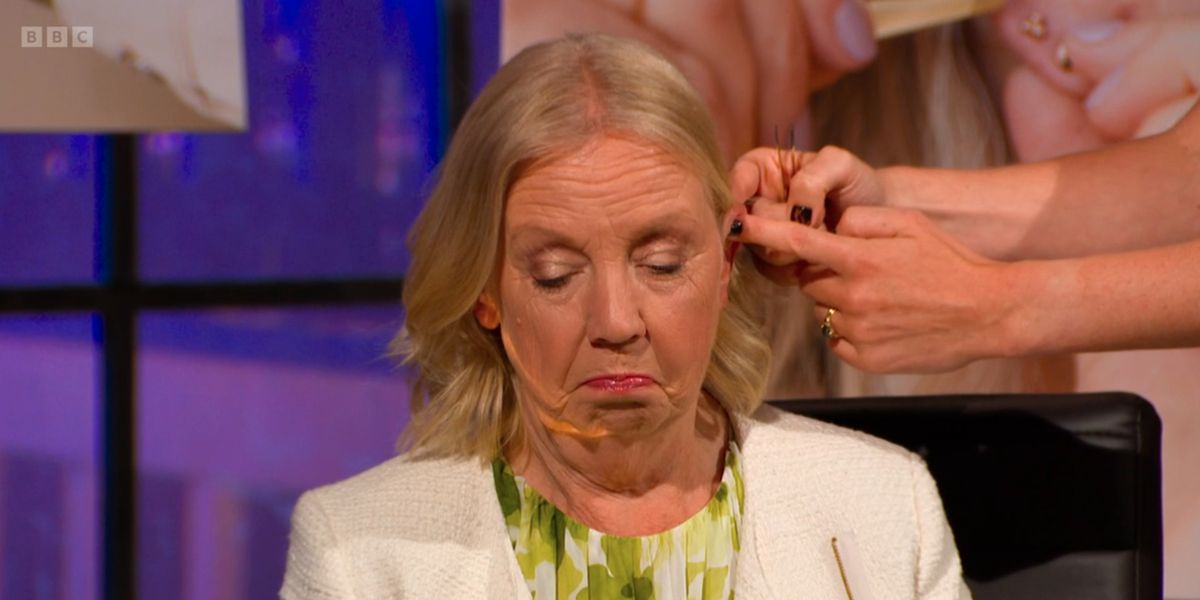- cross-posted to:
- aboringdystopia
- cross-posted to:
- aboringdystopia
It’s caused backlash among the chronic illness community.
While Dragon’s Den viewers were still buzzing over the addition of newest honorary dragon Gary Neville, social media was also discussing the devastating impact Thursday night’s show had on the disability community.
ME (myalgic encephalomyelitis) is a debilitating chronic illness which causes life-changing fatigue, muscle and joint pain, brain fog and headaches to name but a few symptoms.
When a young entrepreneur popped up on Dragon’s Den and claimed that a “personal healing journey” that included ear seeds had aided her recovery from ME within 12 months, most of us living with the condition rolled our eyes, as there’s famously no scientific cure for the condition.
Some in the audience were intrigued, however, and the “Are you watching Dragons’ Den?” messages started rolling in from friends and family.
What Giselle Boxer presented were needle-less acupuncture “ear seeds”. Based on traditional Chinese medicine, acupuncture seeds trigger pressure points – and, from personal experience, acupuncture has certainly helped me temporarily sleep better.
That Giselle is confident that the seeds helped her is wonderful, but also anecdotal. To present her experience as some sort of ‘cure’, with no science to back it up, is concerning for those of us with ME, who are often not taken seriously by medical professionals or the general public.
In the end, Giselle was made an offer by all six Dragons. Whether intentionally or not, Dragon’s Den has now left the door open to yet more ill-advised treatments.
ME is a complex disorder. A large proportion of us do not know what triggered the extreme fatigue that has led many of us to become wheelchair users and to become intolerant of light or noise, even of the touch of our loved ones.
Globally, funding into research is incredibly low despite ME, Chronic Fatigue Syndrome and similar condition Long Covid showing that sufferers have some of the lowest quality of life across all illnesses.
Despite this, some doctors in the UK are still suggesting dangerous treatments such as Graded Exercise Therapy, which has officially been taken out of the NICE guidelines due to it showing that it sets patients back further.
Many sufferers are sadly still faced with accusations that they are faking illness, being lazy or not trying hard enough.
If a tiny stick-on seed featured on Dragon’s Den can cure everything, why are we not whacking them all over our pressure points and skipping off to do a full day’s work followed by an ultra marathon?
Editorially, the BBC has made a grave decision in allowing a product to seem that, coupled with various wellness practises, it could somehow cure an illness, without scientific backing.
Would the BBC allow a show to go out which claimed jelly babies cured heart disease? Or taking up crochet would fix a broken leg?
What was shown on television for several minutes has collectively cost those of us with ME days and days worth of energy, filling in complaint forms and having unneeded conversations with people about the reality of living with our condition.
Dr Charles Shepard, Hon Medical Advisor for the ME Association said: "The way in which Dragons’ Den has been used to promote an unproven treatment for ME/CFS has, not surprisingly, caused a great deal of upset and concern in the ME patient community.
"People with ME/CFS are fed up with the way in which products like this are regularly being promoted when there is no sound evidence from proper placebo-controlled clinical trials to confirm that they are safe and effective.
“These sort of expensive commercial products and devices should not be promoted to very vulnerable sick people until they have been properly assessed for safety and efficacy in clinical trials – in exactly the same way that drug treatments are.”
In response to this story, a BBC spokesperson said: “Dragons’ Den features products from entrepreneurs and is not an endorsement of them. Dragons’ Den shows real businesses pitching to investors to lift the lid on what happens in the business world. This episode features an entrepreneur sharing their own, personal experience that led to a business creation.”
Dragons’ Den has showcased some incredible businesses designed to make disabled people’s lives easier: from all-terrain wheelchairs by AdaptAbility to adaptive clothing company Unhidden.
Getting disability aids onto the screens of millions of people is important to those of us who use them; visibility and societal acceptance are key ways to change things for the better.
However, with such a large audience comes responsibility for BBC Studios, makers of Dragons’ Den, and for the dragons themselves to responsibly question contestants on scientific evidence and data sources.
ME patients don’t have to prove their illness to anyone. But to present one person’s journey unchallenged has a tangible, damaging impact on others.
Response from the BBC is as pathetic as you would expect, comparing this pseudo, or even flat out un scientific nonsense to wheelchairs? Tells you everything you need to know about how little they give a shit…
There is such a big lack of basic science understanding… You should not need an higher education in order to have some science understading and critical thinking skills…
What am i saying… if we had that we wouldnt have Trumps, de santis, boris johnsons, etc…
It’s a feature, not a bug…


